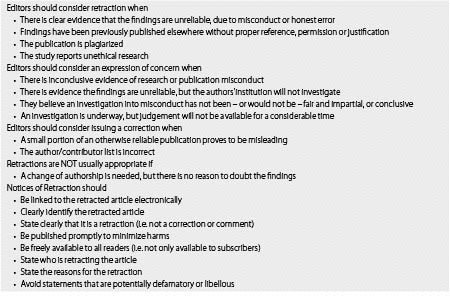* summarized from the Committee on Publication Ethics
and that any potential personal conflicts of interest are avoided or at least made transparent.
COPE has outlined a code of conduct for journal editors, listing essential responsibilities (see Table 35.1). While much of this effort concentrated on the administrative duties and transparency of medical editorship, the code included important responsibilities to assure that allegations of misconduct are properly investigated.
A critically important, and difficult responsibility of medical editors is one of “cleansing” the medical literature when instances of publishing misconduct are proven. This is especially important if the reliability of data is in question, since erroneous or fraudulent results has ramifications for both patient care and future research. Although the COPE published code of conduct for editors charges them with retraction of fraudulent or unethical research (see Table 35.2), barriers to such retractions may include protracted investigation processes, author disagreement, threats of litigation, and misunderstandings by editors themselves of appropriate actions to take. COPE emphasizes that the purpose of retraction should always be correction of the literature, and not punishment of the author,
Table 35.2. Guidelines for retracting articles*

because problems in publishing can occur due to honest mistakes as well as willful misconduct. Investigation and punishment are best referred back to the author’s institution for further action.
Case resolution
The introductory case is an example of fabrication of data. Moreover, the anesthesiologist improperly involved an unknowing colleague in the fraud by attaching his name to the research. The concerns about the anesthesiologist’s research were raised at his home institution, which then notified journals in which his publications appeared. All of the researcher’s articles were retracted. However, “scrubbing” the literature of all citations of this research as well as managing derivative publications from related research is an ongoing task that may never be complete. The effects on patients are unknown. Because the research results encouraged the use of medications that may have had detrimental effects on bone healing, both physical and financial harms to patients on a large scale remain possible.
Key points
• Publication serves physicians’ ethical duties to improve medical knowledge, provide continuing benefits to patients, and avoid harmful or ineffective treatment.
• Publication is an integral part of academic medicine – crediting research, creative thoughts, and educational efforts.
• Few regulatory bodies exist globally to investigate scientific fraud.
• Authors have ethical obligations to be truthful regarding credit for the work and outcomes of research.
• Fabrication and falsification of data, plagiarism, misleading assignment of authorship and redundant publications all are detrimental to the mission of medical publication.
• Journal editors have parallel responsibilities to assure accuracy in the medical literature. They have additional responsibilities to try to assure that appropriate investigation occurs if fraud is suspected, and to retract suspect material when it is discovered.
References
1 Winstein, K.J. and Armstrong, D. Top pain scientist fabricated data in studies, hospital says. The Wall Street Journal. March 11, 2009. http://online.wsj.com/article/SB123672510903888207.html.
Stay updated, free articles. Join our Telegram channel

Full access? Get Clinical Tree




